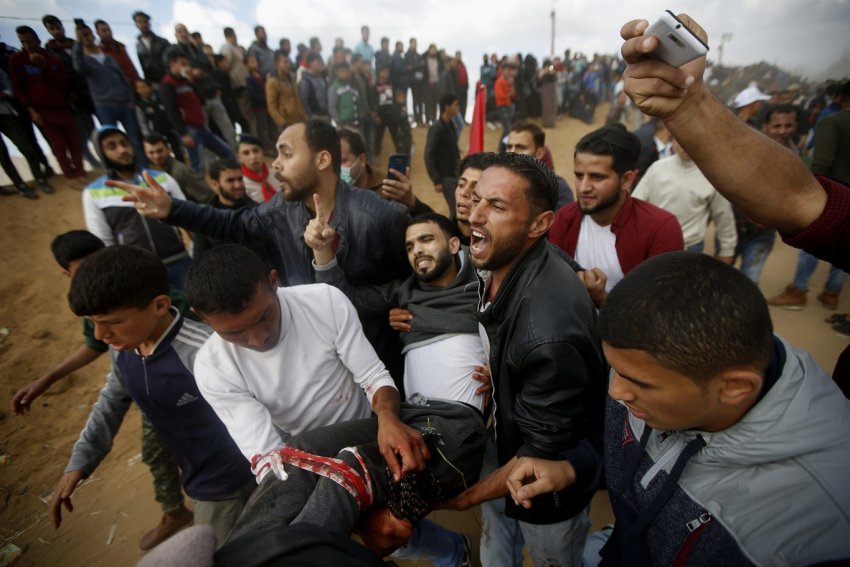
On March 30, Israeli troops killed 18 Palestinians and wounded more than 1400 others — 758 of whom were injured due to live fire. Others were wounded from rubber bullets and tear gas. This behaviour was condemned by Amnesty International and United Nations Secretary-General Antonio Guterres.
When a draft resolution of condemnation was brought to the UN Security Council, the United States blocked it. This was not surprising, given the US has often defended Israeli war crimes in the UN.
Nevertheless, many countries, including Jordan, Iran and notably Turkey, released statements of condemnation against the behaviour of Israeli troops towards unarmed protesters.
A presidential spokesperson released a statement on March 30 declaring the Turkish government’s strong condemnation towards “Israel’s attack on defenceless Palestinian civilians who attended the peaceful demonstrations in Gaza today”.
This is a strong statement worthy of admiration, but it also demonstrates Turkey's inconsistency. The government of Turkey uses a standard of scrutiny against Israel’s treatment of Palestinians that it rarely subjects to its own treatment of Kurds.
Suffice it to say, it is clear that Turkey faces a “Kurdish question” — a question which it seeks not to resolve. By 1998 the government had put the number of internally displaced Kurds (who make up about 20% of Turkey’s population) at 378,335. Much like the Israeli occupation, Turkey had forcibly evacuated more than 905 villages and 2523 hamlets.
These are the government’s own figures. Local human rights groups put the number of internally displaced people at up to 3 million. Amid its war with the Kurdistan Workers’ Party (PKK), the Turkish government razed thousands of villages to the ground and forcibly disappeared hundreds of journalists armed only with their pens.
Whereas some of the more extreme anti-Kurdish laws have been rolled back, since the government ended peace talks with the PKK in 2015, the Turkish armed forces have often punished the inhabitants of cities like Diyarbakir, Cizre and Sirnak, home to large numbers of Kurds. This was especially due to the electoral success of the Kurdish-Turkish left alliance, the Peoples' Democratic Party (HDP).
In May 2016, the UN High Commissioner for Human Rights (OHCHR) Zeid Ra’ad al Hussein publicly condemned the Turkish government for its brutal treatment of its Kurdish population.
“Most disturbing of all,” the High Commissioner said, “are the reports quoting witnesses and relatives in Cizre which suggest that more than 100 people were burned to death as they sheltered in three different basements that had been surrounded by security forces.”
Human Rights Watch claimed that “some civilians were killed in neighbourhoods where there were no clashes or barricades”.
A new report released by the OHCHR this year said a total of 792 buildings were razed between November 8, 2016 and May 28, 2017. On August 31 last year, OHCHR said a Turkish army drone bombed four unarmed people at a picnic in Hakkari.
In response to the report, Turkey accused al-Hussein of collaborating with terrorism. It is a similar rationale to that of former US diplomat Elliot Abrams, who, after Israel’s Operation Pillar of Defence in 2012, criticised Amnesty International for treating “Hamas and other terrorist groups” with “even-handedness”.
It was no surprise, then, that on March 31, Turkish President Recep Tayyip Erdogan’s advisor Ilnur Cevik told CNN that Turkey’s actions towards the largely Kurdish Afrin canton in Syria, which it now occupies, are modelled on Israel's occupation of Syria’s Golan Heights.
“We are bringing humanitarian aid to the people, establishing a new system for them,” he said. “Israel did the same.”
Turkey is right to condemn Israel for its abhorrent actions. It makes sense why Erdogan — who is trying to fashion himself as the new caliph of the Muslim peoples — does so. But Turkey should be more open, like Cevik, about its similarities with Israel.
Because its strategies of occupation are not the only similarity.
Turkey also gets away with killing unarmed subjects who were never given the right to self-determination. And just as Palestinian life is expendable to the Israeli state, so too is Kurdish life expendable to Turkey’s.
[Slightly abridged from The Region.]
Like the article? Subscribe to Green Left now! You can also like us on Facebook and follow us on Twitter.